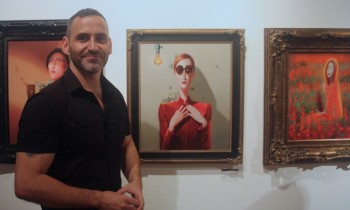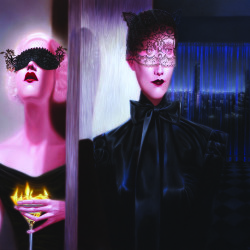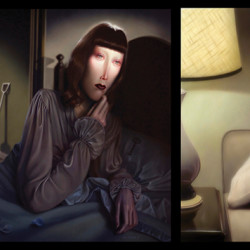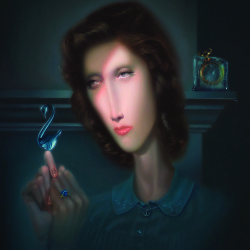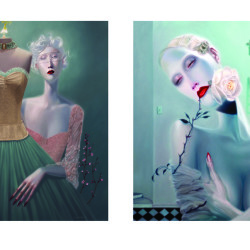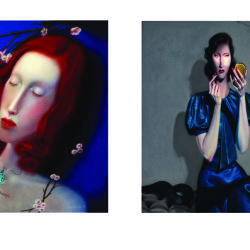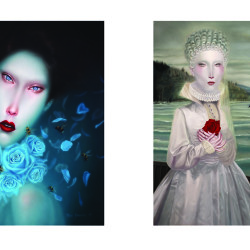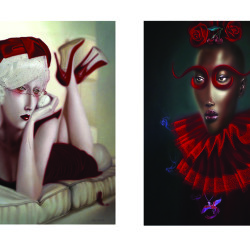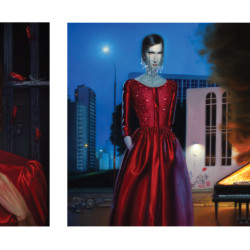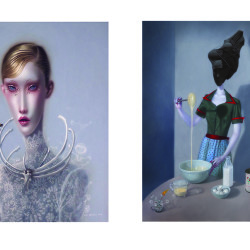Troy Brooks is a featured artist of the Miroir Magazine Inner Vision edition
Q: How long have you been an artist? Please tell us a little about your chosen medium.
A: I’ve been drawing since I was two years old. My mother was a painter and I started working quietly beside her since before I could speak. I work in oil on canvas because it allows for the kind of blended hazy effect I try to achieve.
Q: Have you been trained, and if so from what institution? Or are you self taught?
A: I’m completely self-taught. My parents wanted me to have the proper art training, but I really had no interest in being a professional artist, commercial or otherwise. It seemed like a lonely life of pauperdom. Also, when I was very young I got drafted into doing commissioned portraits for people in the neighborhood and, for me, there is no hell more grizzly than doing family portraits. The only attractive thing about art to me has always been the freedom of pursuing my imagination. So I hated being an artist for hire. I didn’t think anyone would be interested in my weird, cryptic pictures of virago women. So for many years, my art was something I did privately. It wasn’t until I saw a piece by the artist Ray Caesar that I thought there could be a place in the fine art world for my girls.
Q: What inspires your creations?
A: My work is born out of everything I repress. In the same way a very quiet young man can transform into a thunderously imposing amazon when he goes in drag, I tend to express my more aggressive tendencies through the women I paint. Since I’ve always been obsessed with the broad-shouldered bitch-goddesses in classic film noir, that’s the form they take organically. Since I was in grade school I collected books of very old Hollywood photographs and spent my entire adolescence sketching all those images of towering, stylishly attired women. Consequently a lot of the characters in my work tend to have that aesthetic of hard-boiled glamour.
Q: Was your family supportive of your artistic endeavors?
A: Absolutely. When I showed an early aptitude for technical skill, they tried to get me interested in commercial art. But I hated being forced to paint things for other people. They were very disappointed in my disinterest. But it’s very possible that if I’d had the proper training, it might have eclipsed the style that naturally developed from being self-taught.
Q: Is there someone special who has encouraged your work and your path as an artist?
A: Besides my mother, not really. No one else in my family is interested in the arts at all. It’s been a bit of an isolating path. Growing up, nobody related to the images of women I made. They could only appreciate the technical skill. I come from a small town and I think my art gave most people the creeps.
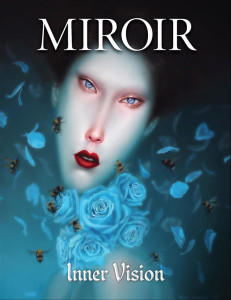 Q: What are your hopes and dreams or future goals?
Q: What are your hopes and dreams or future goals?
A: I live my life in service to my work. That’s when I’m the most happy. I’m basically like a monk in many ways where my work is concerned. There can be a lot of sacrifice involved with such an all-consuming pursuit, but I feel proud to be part of a long tradition of painters and I take it very seriously. I think I make a unique contribution to the contemporary chorus of artists. I’ve been outrageously lucky to have garnered a dedicated patronage in such a short period of time. It’s afforded me this life as a full-time artist in a very expensive city. My goal is to sustain myself stylishly as an uncompromising artist.
Q: Are there any historic works of art that you feel were visionary, and why? How did this art affect you?
A: I think the work of Klimt during his gold period is still influential. There is a sense of timelessness and graphic design in his figures. They are eternally modern. In a way, his work gave me context for my own.
Q: Do you feel as an artist that it is important to change the world, to have a vision? If so what would you hope to change?
A: Changing the world seems a bit of a lofty idea to me. Anything is possible, but something tells me if you set out to change the world with your art, it’s going to be tedious and flat. In my experience, for creative work to matter to an audience it has to be inherent. When I’ve tried to impose any kind of political or social agenda to my work, it comes out contrived. But when I’ve been able to pull from a place of instinct, the work becomes layered and multidimensional. Creativity can definitely have an effect on the global consciousness, but I think it has to come about from an organic intuitiveness. My best work has been created with no one in mind but me.



